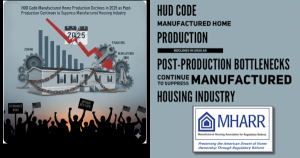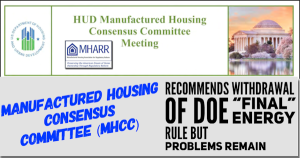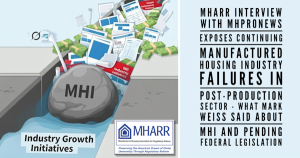Please find below a copy of the April 14, 2025 emailed “MHARR WASHINGTON UPDATE” – an exclusive report and analysis addressing the following topics.
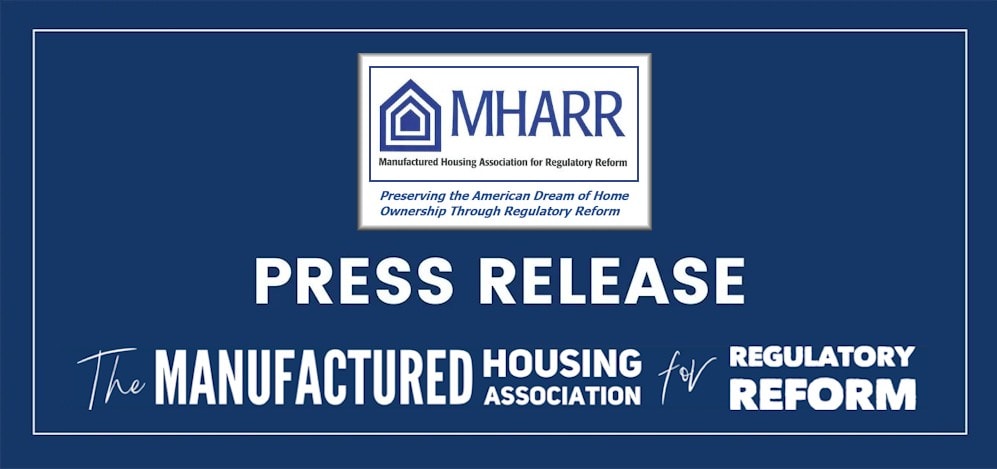
- MHARR ADDRESSES INDUSTRY BOTTLENECKS WITH HUD SECRETARY
- PRESIDENT/HUD SECRETARY PUSH AFFORDABLE HOMEOWNERSHIP
- MH PROGRAM MISMANAGEMENT HURTING SMALL BUSINESSES
- NEW FHFA DIRECTOR CONFIRMED – TAKES INITIAL ACTIONS
- DOGE IMPACTS AT HUD
- DOE WITHDRAWS BIDEN-ERA APPLIANCE ENERGY STANDARDS
- DOE MANUFACTURED HOUSING ENERGY STANDARDS IN LIMBO
Manufactured Housing Association for Regulatory Reform (MHARR)
1331 Pennsylvania Ave N.W., Suite 512
Washington D.C. 20004
Phone: 202/783-4087
Fax: 202/783-4075
Email: MHARRDG@AOL.COM
Website: www.manufacturedhousingassociation.org
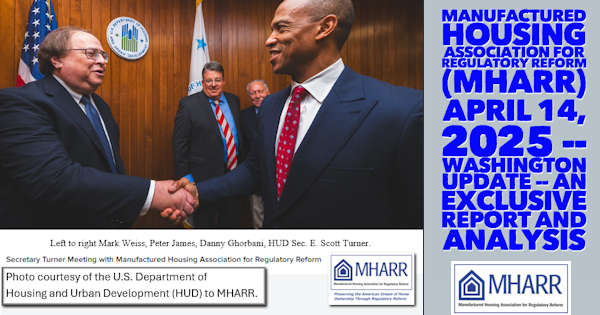
—
Manufactured Housing Association for Regulatory Reform (MHARR)
APRIL 14, 2025 — WASHINGTON UPDATE — AN EXCLUSIVE
REPORT AND ANALYSIS
REPORT AND ANALYSIS
IN THIS REPORT: APRIL 14, 2025
- MHARR ADDRESSES INDUSTRY BOTTLENECKS WITH HUD SECRETARY
- PRESIDENT/HUD SECRETARY PUSH AFFORDABLE HOMEOWNERSHIP
- MH PROGRAM MISMANAGEMENT HURTING SMALL BUSINESSES
- NEW FHFA DIRECTOR CONFIRMED – TAKES INITIAL ACTIONS
- DOGE IMPACTS AT HUD
- DOE WITHDRAWS BIDEN-ERA APPLIANCE ENERGY STANDARDS
- DOE MANUFACTURED HOUSING ENERGY STANDARDS IN LIMBO
MHARR MEETS WITH HUD SECRETARY ON INDUSTRY BOTTLENECKS
A delegation of MHARR officials took the Association’s concerns over industry-suppressing bottlenecks and endemic mismanagement of the HUD manufactured housing program directly to the top on March 25, 2025, in a meeting with new HUD Secretary Scott Turner.
The MHARR group, including MHARR Chairman Peter James, President/CEO Mark Weiss, MHARR Chairman Emeritus Edward J. Hussey, Jr. and MHARR Senior Advisor Danny D. Ghorbani, met with Secretary Turner and other senior HUD officials for nearly one hour. MHARR took this opportunity to highlight critical industry and HUD program issues that can, should and must be definitively addressed during President Trump’s second administration.
Specifically, the group noted that the manufactured housing industry must be regulated at the federal level due to its unique characteristics and in order to preserve its unique non-subsidized affordability, which is a function of uniform, performance-based federal standards; uniform federal enforcement; and robust federal preemption. That said, however, the delegation pointed out that the HUD program has been and continues to be severely mismanaged citing, as examples, HUD’s baseless long-term exclusion of collective representation for independent manufacturers on the statutory Manufactured Housing Consensus Committee (MHCC) and the program’s excessive reliance on an entrenched “monitoring contractor” selected continuously since the inception of federal regulation, often on the basis of de facto sole-source procurements, while failing to abide by mandatory sole-source procedures and legal protections. The MHARR delegation urged the Secretary to take steps to remedy this indefensible mismanagement of the HUD program.
The group then outlined for the Secretary the key policy bottlenecks that have stunted the growth and expansion of the HUD Code industry at a time when the demand for affordable housing and homeownership has never been higher. These include, most particularly, the pending draconian U.S. Department of Energy (DOE) manufactured housing “energy conservation” standards (and any parallel HUD standards) and the discriminatory and exclusionary zoning edicts which bar manufactured homes from many jurisdictions around the United States. MHARR also noted the unavailability of competitive-rate consumer financing within the industry’s dominant personal property consumer lending sector due to the failure of both Fannie Mae and Freddie Mac to implement (at all) the statutory Duty to Serve Underserved Markets (DTS).
With regard to zoning exclusion, the group emphasized that HUD, under the enhanced federal preemption of the Manufactured Housing Improvement Act of 2000 (2000 Reform Law), had ample authority to federally preempt state and local exclusionary zoning edicts, and strongly urged the Secretary to wield that authority in order to promote the availability of inherently affordable mainstream manufactured homes in all areas of the country.
In addition, the group called on the Secretary to ensure the inclusion of mainstream HUD Code manufactured homes in all HUD housing and homeownership programs, specifically including a new initiative, outlined by both the Secretary and President Trump, to dedicate large tracts of federally-owned land as locations for the placement of affordable homes. MHARR specifically noted that the combination of federal land availability with optional removable chassis (i.e., non-“permanent” chassis) as would be permitted by Sen. Tim Scott’s “ROAD to Housing Act” would create a new paradigm for the industry that would allow it to dramatically increase production numbers and achieve its true potential as a housing resource for a much larger number of Americans.
MHARR will continue to follow-up with the Secretary and senior HUD officials to aggressively pursue all of these policy objectives and urges the broader industry to do the same.
—
PRESIDENT/HUD SECRETARY STRESS AFFORDABLE HOMEOWNERSHIP – MHARR SEEKS TO ALIGN INDUSTRY TO FULFILL THIS NEED
Both President Trump and HUD Secretary Scott Turner, in recent weeks, have addressed the possibility of utilizing certain federally-owned land areas as hubs for the development of affordable housing. Now, in accordance with that vision, the U.S. Department of the Interior (DOI), in cooperation with HUD, is reportedly considering selling federal tracts with a cumulative size of 400,000 acres, or 625 square miles, for such use. The areas being reviewed by DOI are located within ten miles of cities and towns with a population greater than 5,000 and could be used to site as many as 7 million “affordable homes” according to DOI Secretary Doug Burgum.
In its recent meeting with HUD Secretary Scott Turner, MHARR top executives stressed the need to include affordable, mainstream HUD Code manufactured housing in all current and future HUD affordable housing programs, including the above-referenced federal land program, assuming that it moves forward to fruition. MHARR emphasized that full inclusion in that program would represent a new paradigm for both manufactured housing and HUD. This is because, given the fact that manufactured homes are comprehensively regulated by the federal government, HUD has, at its disposal, a ready-to-serve industry with the means, technology and know-how to fulfill this critical need. In this scenario, consumers of affordable housing (particularly younger Americans, senior citizens and all other moderate and lower-income consumers) would benefit from the ability to access inherently affordable mainstream HUD Code homes in large areas of the United States, while the industry would benefit from freer access to areas where mainstream manufactured homes have either been excluded or discriminatorily restricted. Moreover, such access, together with the potential utilization of manufactured homes with removable chassis, as would be permitted by Sen. Tim Scott’s “ROAD to Housing” Act, would open new markets and new opportunities for both the industry and consumers.
Currently, a Task Force, including members from both DOI and HUD is being formed. HUD, for its part will reportedly “pinpoint where housing needs are the most pressing,” while DOI “will identify locations that can support homes” while considering both environmental impacts and land use issues.
Based on the potentially significant new opportunities that the Trump/Turner affordable housing plan could provide for the HUD Code industry, MHARR will continue to aggressively advocate for the full and robust inclusion of manufactured housing in any and all resulting activities.
—
MH PROGRAM MISMANAGEMENT HURTING SMALLER INDUSTRY BUSINESSES
Mismanagement of the federal manufactured housing program at HUD continues to disproportionately impact and harm the interests of smaller HUD Code industry manufacturers and businesses in particular. Such mismanagement has been thrust into the spotlight once again by HUD’s manipulation and gerrymandering of member appointments to the statutory Manufactured Housing Consensus Committee (MHCC), as well as the program’s continued – and now 50-year – non-stop dependence on a “monitoring” contractor that has been awarded successive de facto sole-source contracts since the inception of the program without the observance of mandatory legal safeguards for such procurements. These and other program mismanagement issues were addressed by MHARR at its recent meeting with HUD Secretary Scott Turner.
Since at least the tenure of former HUD program Administrator Pamela Danner, appointments to the statutory MHCC — a centerpiece program reform of the Manufactured Housing Improvement Act of 2000 (2000 Reform Law) — have discriminated against the representation of smaller and medium-sized industry producers by, among other things: (1) unlawfully excluding any collective voting representation (through MHARR) for such producers; (2) manipulating individual company representation to either exclude or under-represent smaller producers; and (3) serially appointing and re-appointing certain preferred members (including representatives of the industry’s largest corporate conglomerates) in order to skew the composition of the Committee and assert unlawful HUD domination of Committee activities and deliberations. In doing so, program management is gradually regressing the MHCC back into the dysfunctional and discredited (former) Manufactured Housing Advisory Council, which was terminated by Congress and replaced by the MHCC in the 2000 Reform Law.
Such manipulation of the MHCC, together with continued HUD dependence on its entrenched “monitoring” contractor via circumvention of applicable legal mandates requiring “full and fair” competition for federal contracts, amount to an ongoing bureaucratic veto of the most crucial reforms legislated by Congress in the 2000 Reform Law. This intentional assault on applicable and binding law is unacceptable and will be aggressively pursued by MHARR for a full and proper resolution by the Trump Administration.
—
PULTE CONFIRMED BY SENATE AS FHFA DIRECTOR – TAKES INITIAL ACTION
President Trump’s nominee to serve as Director of the Federal Housing Finance Agency (FHFA), Bill Pulte, was confirmed by the U.S. Senate on March 13, 2025. Pulte will succeed former FHFA Director Sandra Thompson. Under Thompson, FHFA allowed Fannie Mae and Freddie Mac to continue their nearly 20-year failure to serve – at all – the manufactured housing personal property lending market under the Duty to Serve Underserved Markets (DTS) mandate. This despite the fact that the DTS mandate, as expressly set forth in the Housing and economic Recovery Act of 2008 (HERA), specifically includes and embraces such chattel loans within the manufactured housing consumer financing market. While MHARR has consistently and aggressively called on FHFA (including in one-on-one meetings with Director Thompson) to take a harder line with the Government Sponsored Enterprises (GSEs) – which clearly do not want to serve the HUD Code chattel market and have invented a string of excuses for failing to do so – FHFA nevertheless approved successive Fannie and Freddie DTS “implementation plans” that made no provision for support of the chattel market. This has essentially forced nearly 80% of the Americans who purchase mainstream, affordable manufactured homes through chattel loans into higher-rate pseudo-predatory lending.
Given the advent of the Trump Administration and the resulting change in leadership at FHFA, MHARR will renew and enhance its engagement with senior-level FHFA officials to seek – finally – the full and robust implementation of the DTS mandate within the manufactured housing consumer finance market, including the 70-80% of manufactured home consumer loans financed through personal property lending. Quite simply, a key part of “making America great again,” is the absolute necessity of resolving and remedying the nation’s unprecedented – and now chronic – affordable housing crisis. But that cannot and will not happen without a significant increase in the supply and availability of inherently affordable mainstream manufactured housing. Increasing that availability, in turn, will require a greater supply of competitive-rate consumer financing loans on manufactured homes which, history shows, will not happen in the existing competition-starved manufactured housing consumer lending marketplace, without the full implementation of DTS on a market-significant level.
Meanwhile, Director Pulte has already started to implement Department of Government Efficiency (DOGE) cost-cutting measures at FHFA, reducing its “active workforce” by 25%. In addition, Director Pulte — who simultaneously now serves as the Chairman of the Fannie Mae Board of Directors — announced the termination of over 100 Fannie Mae employees who were allegedly “caught engaging in unethical conduct, including facilitating fraud” against the mortgage giant. This step, together with the structural change involved in having the FHFA director now serve simultaneously as a member of the Fannie Mae Board, will hopefully lead to greater accountability for both GSEs and for more effective and meaningful FHFA regulation of both entities. More effective and responsive FHFA regulation, in turn, could have beneficial implications for the full implementation of DTS.
Based on comments offered by Director Pulte at his Senate confirmation hearing, it appears that he supports greater access to – and availability of – manufactured housing as a way to address and remedy the affordable housing shortage. Such comments, however, must be translated into concrete action by FHFA, Fannie Mae and Freddie Mac to extend GSE securitization and secondary market support to the mainstream manufactured home chattel lending market. MHARR, accordingly, will continue to aggressively engage with FHFA to seek that end.
HUD CUTS PROGRAMS AND STAFF DURING DOGE REVIEW
HUD Secretary Scott Turner, since his Senate confirmation, has begun to implement DOGE-recommended (and other) cost-cutting measures at the Department, according to media reports. Among other things, HUD has terminated the employment of at least 15% of its staff through a “combination of terminating all probationary employees, accelerating retirement offers, and pursuing an initial reduction in force directed to all non-supervisory field policy and management staff.” In addition, HUD is reportedly planning to close field offices located in 34 states as well as the District of Columbia.
From a policy/program standpoint, HUD has taken steps that may arguably have some relation to issues affecting manufactured housing. First HUD, in a March 10, 2025 Federal Register notice, has delayed the compliance dates for new energy standards previously adopted for certain HUD-financed residential construction. As the HUD notice states, the Department:
“On April 26, 2024 … published [a] Final Determination which adopted the 2021 edition of the International Energy Conservation Code (IECC) and the 2019 edition of ANSI/ ASHRAE/IES Standard 90.1: Energy Standard for Buildings, Except Low-Rise Residential Buildings (ASHRAE 90.1) as the minimum energy standards for new construction of buildings in programs covered by section 109 of the Cranston- Gonzalez National Affordable Housing Act of 1990 (42 U.S.C. 12709), as amended by the Energy Independence and Security Act of 2007 (EISA) (Pub. L. 110–140).” (Emphasis added).
Significantly, a coalition of 15 states as well as the National Association of Home Builders (NAHB), on January 2, 2025, had filed a legal action against HUD’s adoption of these standards arguing, among other things,, that the delegation of de facto regulatory authority to a private body – through automatic adoption of the IECC – was unconstitutional.
Under the March 10, 2025 HUD notice, the dates for compliance with the new standards will be extended by six months in order to provide “additional time for the administration to review questions of fact, law and policy supporting the Final Determination….” While this action does not directly impact the status of the pending U.S. Department of Energy (DOE) manufactured housing “energy conservation” standards, which are authorized by a different section of EISA, it does involve the same 2021 IECC code as the 2022 DOE manufactured housing standards and bolsters MHARR’s position that the DOE (and parallel HUD) manufactured housing energy standards should be withdrawn.
In another move, HUD has also terminated the Biden-era 2021 Affirmatively Furthering Fair Housing (AFFH) rule. That rule effectively required local jurisdictions to consider and promote fair housing policies in connection with zoning decisions, among other things. In that regard, HUD Secretary Turner stated in a press release:
“By terminating the AFFH rule, localities will no longer be required to complete onerous paperwork and drain their budgets to comply with the extreme and restrictive demands made up by the federal government. This action also returns decisions on zoning, home building, transportation, and more to local leaders. As HUD returns to the original understanding and enforcement of the law without onerous compliance requirements, we can better serve rural, urban and tribal communities that need access to fair and affordable housing.”
While this change in policy is significant, it does not and should not impact the effort led by MHARR to seek HUD implementation of the enhanced federal preemption of the Manufactured Housing Improvement Act of 2000 (2000 Reform Law) to override state and/or local zoning exclusion of HUD-regulated manufactured housing. First, and most importantly, federal preemption of discriminatory zoning exclusion of HUD Code manufactured housing rests on an entirely different federal statutory basis than AFFH. Thus, while AFFH was based on a questionable interpretation (and expansion) of the 1968 Fair Housing Act, enhanced preemption regarding manufactured housing is based upon a specific statutory amendment to federal manufactured housing law contained in the 2000 Reform Law, under which the comprehensive federal manufactured housing standards and federal enforcement trump state and local codes, regulations and other “requirements.”
Further, while AFFH, as interpreted by the Biden Administration, imposed significant new and additional costs on local jurisdictions, forcing them to engage in “complex jurisdictional and regional analysis” and the “submission of a 92-question grading tool … and analysis of impediments,” the enhanced federal preemption of the 2000 Reform Law simply requires parity between mainstream HUD Code manufactured housing and other types of single-family homes. In doing so, it does not impose any additional costs or mandates on localities, while promoting and furthering the availability of affordable homeownership.
Consequently, the Trump Administration’s opposition to – and withdrawal of – the 2021 AFFH rule is not relevant or applicable to the preemption of discriminatory and exclusionary zoning as provided by the 2000 Reform Law. MHARR has already begun to address this issue with Secretary Turner and will continue to aggressively pursue this matter going forward.
—
DOE WITHDRAWS BIDEN-ERA APPLIANCE ENERGY STANDARDS
In an action that parallels HUD’s move to delay the implementation of climate-based Biden-era energy standards, the U.S. Department of Energy (DOE) on March 24, 2025, announced the postponement of the “effective dates” of three home appliance “energy conservation rules under the 1975 Energy Policy and Conservation Act (EPCA). These include: (1) test procedures for central air conditioners and heat pumps; (2) energy efficiency standards for walk-in coolers and freezers; and (3) efficiency standards for gas instantaneous water heaters. In addition, and more importantly for the HUD Code manufactured housing industry, DOE announced that:
“Under the leadership of President Trump, the Department has officially withdrawn
four [energy] conservation standards, including standards on electric motors, ceiling fans, dehumidifiers and external power supplies.”
While, once again, these standards were adopted under statutory authority that is different from – and does not apply to – manufactured homes, the fact that DOE was willing to withdraw, rather than merely delay the implementation of these standards, potentially provides an affirmative precedent for the full withdrawal (rather than delay) of the pending DOE manufactured housing “energy conservation” standards and enforcement regulations, as MHARR has consistently sought.
Furthermore, in another action that could provide a useful precedent for the elimination of the pending DOE manufactured housing “energy conservation” regulations, the U.S. Senate, on April 3, 2025, voted along party lines to reject, under the Congressional Review Act (CRA), the same DOE energy standards for walk-in coolers and freezers that had been delayed administratively by the Department. The House of Representatives had passed a similar resolution the week before. With this action, the matter will go to President Trump for final approval. Significantly, once a CRA resolution is adopted and signed by the President, an agency cannot propose a similar regulation in the future.
This use of the CRA, to remove baseless yet costly “climate”-based energy mandates, could ultimately prove to be precedential as well for DOE’s pending manufactured housing energy conservation regulations.
Accordingly, MHARR will continue its aggressive engagement, with both HUD, DOE and other agencies and officials as necessary, to press for the full withdrawal and disavowal of the destructive and unnecessary DOE manufactured housing energy regulations.
—
DOE MANUFACTURED HOUSING ENERGY RULES IN LIMBO – FOR NOW
While it appears that the pending extreme and needlessly costly DOE manufactured housing “energy conservation” standards and related proposed regulations are in fact being delayed, there has been to date – and unlike the DOE and HUD standards addressed above – no formal announcement from DOE regarding either a delay or withdrawal of the said regulations. Again, this differs from DOE’s treatment of other energy standards, which were delayed or withdrawn with specific formal announcements.
While the disposition of the May 31, 2022 manufactured housing energy conservation standards and proposed enforcement rules thus remains a concern, a public court filing in the ongoing litigation filed by the Manufactured Housing Institute (MHI) with regard to these actions, provides some additional insight. According to that filing, a “Joint Motion to Stay Litigation and for an Extension of Time,” filed on February 21, 2025, “DOE intends to initiate rulemaking to propose a further delay to the Final Rule’s compliance date for Tier 2 homes.” As the filing notes, the compliance date for Tier 2 homes, at present, is July 1, 2025, now just three months away. The motion thus asks for a delay in the court proceedings pending publication of a delay notice by DOE.
While such a delay is clearly warranted, it is by no means sufficient. Rather than a mere delay, the entire standard should (and must) be withdrawn in its entirety, as should the parallel proposed enforcement regulation. As MHARR has demonstrated repeatedly in its written comments and in other forums, the DOE rules are baseless, unnecessary, and would needlessly impose unacceptable and unsustainable costs on manufactured homebuyers in a manner that would extend, exacerbate and deepen the already unprecedented affordable housing crisis.
Rather, these regulations, rooted in the phony climate alarmism of the Biden Administration and the fever-dreams of climate/energy extremists and special interests, should be rejected, withdrawn and eliminated by the Trump Administration consistent with its decisive action on other similar matters as set forth above. The DOE standards should be fully withdrawn, not delayed.
MHARR is a Washington, D.C.-based national trade organization representing the views and interests of independent producers of federally-regulated manufactured housing.
The “MHARR Washington Update is available for re-publication in full or in part (without alteration or substantive modification) without further permission and with proper attribution and link-back to MHARR.


